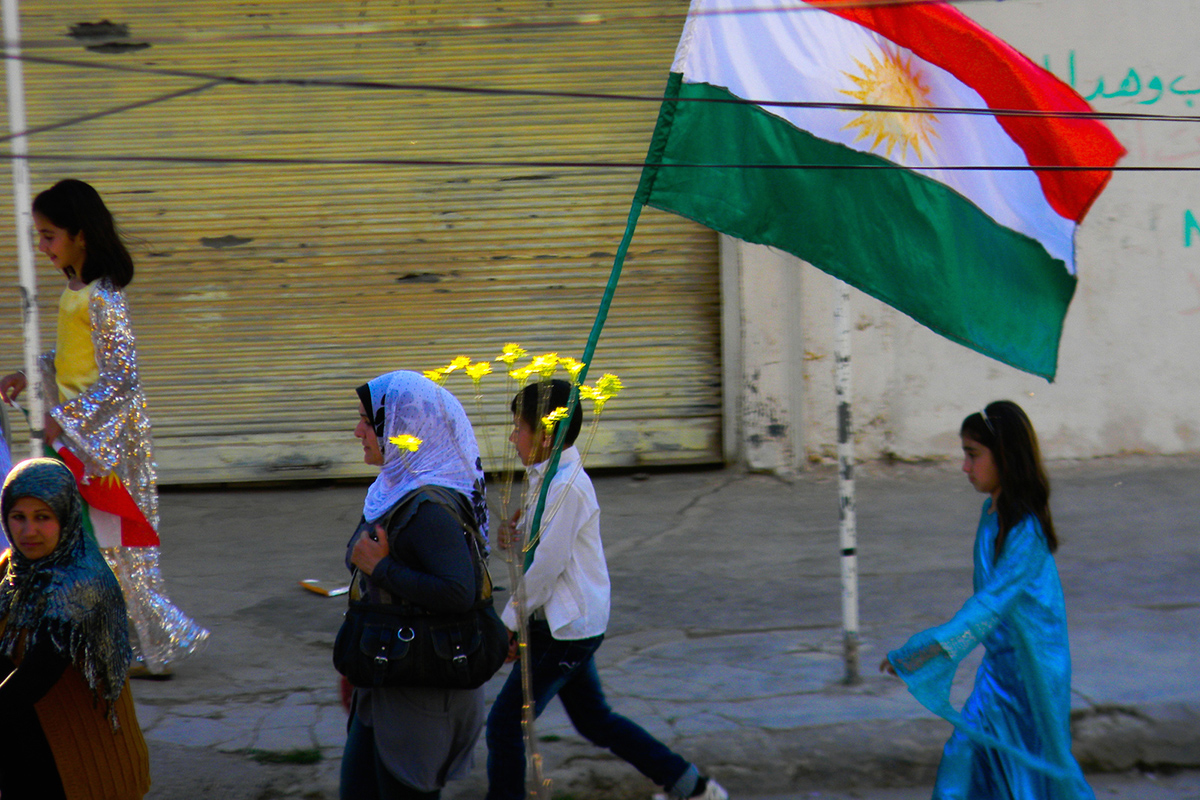With much of the world focusing on the Islamic State (IS) and its offensive on Kobane, very little is known about the Kurdish people, who call the Syrian-Turkish border town home.
The Kurds are an ethnic group in the Middle East and Central Asia. The Kurdish question is a term widely used in reference to the fact that Kurdish people do not have a homeland. Kurdish world population is estimated at thirty million, the largest ethnic group without its own state. Kurdistan is divided into four regions; including parts of Iran, North-eastern Syria, South-eastern Turkey and Northern Iraq where Kurds live. This dates back to the end of World War I when the Ottoman empire was divided and different ethnic groups with the own culture and languages were forced to occupy the same homeland together.
About 20% of the Kurdish population is estimated to be living within the borders of Turkey, but for in the years since the Republic of Turkey was formed, the government has been battling with Kurds movements who are trying to achieve autonomy within the country.
The most prominent movement is the Kurdish workers party (Partiya Karkerên Kurdistan) known as the PKK. The PKK is an armed movement, said to be born out of desperation, seeking autonomy for the Kurds in Turkey. The Turkish state forced Kurds to assimilate, banning the speaking and teaching of Kurdish, and forced many to exile prior to the establishment of the PKK. The Kurdish areas overlap nation-state borders and are vulnerable to interference and manipulation by regional and international powers.
The PKK is distinguished from other Kurdish political parties by its social base, which includes workers and peasants. It advocates both socialism and independence for greater Kurdistan, and puts a priority on armed struggle. As a result of this, the organisation has been teamed as a terrorist organisation by the United States and by Turkey itself. In recent weeks police in Turkey have been raiding homes and buildings which they suspect PKK members to be hiding in.
PKK resistance
Whilst the PKK is not the only Kurdish political organization in Turkey, its ability to sustain a campaign of armed struggle against the Turkish army has won it a leading position and popular support in both urban and rural Kurdish areas, as well as in the Kurdish diaspora. However, according to Amir Hassanpour who wrote a paper on the Kurdish experience, many Kurds have criticised the PKK for indiscriminate attacks on Turkish civilians in the past, which has resulted in injury, and also death.
Most recently the U.S government have reportedly asked the Kurdish people to hold off on the call for an independent state as countries in the middle east and abroad have taken on the fight against the Islamic State of Iraq and the Levant (ISIL) who are trying to create their own empire.
Roj Welat, a member of the Kurdistan Communities Union (KCK) says that their aim as a union is to develop solidarity between the people of South Africa and the Kurdish people in order to open a pathway to find a peaceful and democratic solution to the status of Kurdish people in the Middle East.
Democratic processes
“The Kurdish issue is a social problem because of the anti-democratic system within the Middle East,” says Welat.
According to Welat, the Kurdish issue has been developing over the decades. After the first World War, the new Turkish republic started adopting policies of denial and humiliation of the Kurdish people living within the Turkish borders. The KCK believes that the Kurdish question can be solved through peaceful, democratic and political means.
The dynamics of assimilation, repression and Kurdish resistance in each country have affected the direction and outcome of the Kurdish struggles in the various countries situation in the Middle East and Central Asia.
With the situation in Turkey escalating, the KCK have documented instances of attacks on the Kurdish population. According to their research with Erdogan’s (President of Turkey) ending of the Kurdish-Turkish peace process on the 24th of July a new total war against the Kurds has started. Since this date they have documented cases where Kurdish mountains, villages and geography have been under daily attack and bombardments.
The union believes that the main reason behind these attacks and the extrajudicial killings of civilians is down to Turkish President Erdogan giving unlimited powers to the security forces.
Unfortunately, little is known about Kurdish history and the suffering they have faced for decades. It is largely due to lack of information about the Kurdish people that their struggle remains unresolved, and also because the demographics of Kurdistan ensure that any political movement for liberation and self-determination is bound to affect so many countries. The Kurds have also taken up the fight against ISIL so independence for the Kurdish people might still be a long while away. VOC (Umarah Hartley)






 WhatsApp us
WhatsApp us 


1 comment
This article fails to mention that despite the Kurdish being Muslims themselves, Turkey, Iran and the surrounding Arab states don’t seem to consider them as their Muslim brothers and sisters. This failure can’t be blamed on the Western powers, but rather blind nationalistic endeavours of Turkey and the surrounding states wanting a piece of oil rich Kurdistan.
If Muslims in the Middle East can’t live with other Muslims of a different persuasion, how then are we going to prove to the world that Islam is a peaceful religion?
Right now, it does seem that the Kurds are extolling the virtues of Islam better than ANY other Muslim country on this planet, especially when Kurds are fighting for the human rights of Yazidis, Christians, and other minority groups in the region.
But don’t believe me. For in-depth coverage on what its like to live in Kurdistan, check out the blog by Sazan Mandalawi here, http://mandalawi.me/